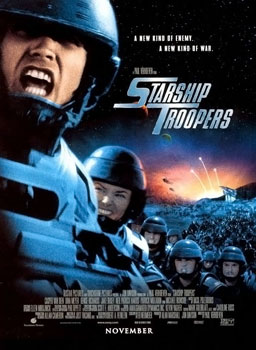

The wealth and prosperity that followed in the wake of World War II contributed to Heinlein’s utopian vision of the future and the book’s concern that excessive privilege, peace, and prosperity contribute to the moral decline of human society. Finally, Starship Troopers was published at the height of the Golden Age of American capitalism. The stamp of this conflict between American democracy and Soviet communism appears in Starship Troopers’ overt arguments against communism and its presentation of a “communist” enemy in the Bugs. These tests happened in the broader context of the Cold War.

Heinlein also expressed his opposition to nuclear test suspension by sending a 500-person petition to the White House. Heinlein took up Starship Troopers as a direct response to the suspension of missile tests being negotiated between President Dwight Eisenhower’s administration and the USSR in 1958. At the time, he was a “flaming liberal,” but the conservative and libertarian shift in his thinking can be traced through his later works, including Starship Troopers and The Moon is a Harsh Mistress (1966).

The bombings of Hiroshima and Nagasaki in 1945 inspired him to start including more overt political themes in his works. Heinlein began publishing science fiction stories in 1939, during the height of World War II. He died in his sleep of heart failure and emphysema-having been a lifelong smoker-in 1988. In 1977, he was one of the first people to undergo a carotid bypass surgery. Subsequently, in the 1970s, he and his wife became advocates for reorganizing and expanding the American blood donation system. In his later years, Heinlein suffered a series of health crises, including one which required multiple blood transfusions. During his lifetime, Heinlein published 32 novels, 59 short stories, and 16 collections more nonfiction, poetry, short stories, and collections were published after his death. His first short story, “Life Line,” was published in Astounding Science Fiction in 1939, launching his literary career. Heinlein worked a series of odd jobs and dabbled in politics after leaving the Navy. entered World War II, he was prevented from reenlisting due to the tuberculosis, as there wasn’t yet a cure available. He took early retirement after five years, having suffered tuberculosis and chronic sea sickness during his term. His Navy assignments included radio communications-still a relatively new technology in the early 1930s-and gunner. Naval Academy in Annapolis, Maryland, graduating in 1929 with an ensign’s commission and the equivalent of an engineering degree. Heinlein grew up in Kansas City, Missouri in a German-American family that had been in the U.S. Robert Heinlein was the third of seven children born to Rex and Bam Heinlein.


 0 kommentar(er)
0 kommentar(er)
